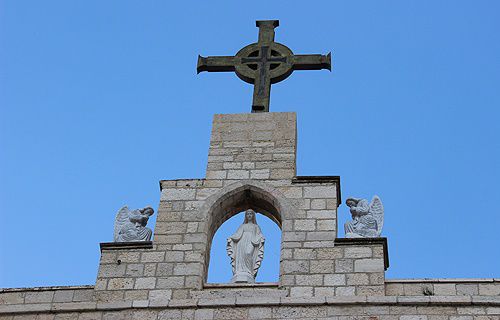Palestinian Christians, a monastery, a convent and a Catholic school near Bethlehem are all at risk from the Israeli government’s planned security barrier in the West Bank’s Cremisan Valley, the U.S. bishops have told members of Congress. “The proposed routes of the separation barrier would effectively confiscate the Palestinian agricultural and recreational lands of over 50 Christian families. This threatens the livelihoods of the remaining Christian community of Bethlehem, pressuring even more to leave the Holy Land,” Bishop Oscar Cantu of Las Cruces told leaders of Congress in a Feb. 11 letter on behalf of the U.S. bishops’ Committee on International Justice and Peace. The Cremisan Valley is near Beit Jala, Beit Sahour, and Bethlehem, in the West Bank territory of Palestine. Bishop Cantu, who visited the valley in January, said the barrier would have “devastating consequences” for the local community. “The situation in the Cremisan Valley is a microcosm of a protracted pattern that seriously jeopardizes the Israeli-Palestinian peace process,” he added. The bishop asked leaders of the Senate and House committees on foreign relations and foreign affairs to intervene with the Israeli government to stop the barrier. If the barrier is constructed as planned, it would cut off a Salesian monastery from a nearby convent and isolate their ministries from “critical resources and contacts with the local population,” Bishop Cantu said. “In one case, the proposed route would surround a Salesian school for 450 students on three sides with a militarized barrier,” the bishop warned. He cited a December 2014 statement from the Assembly of Catholic Ordinaries of the Holy Land which said the wall “alienates the most basic rights and freedom of the Christian community of Beit Jala.” The assembly warned that the barrier’s construction would result in continued emigration for the mostly Christian community in the Cremisan Valley. Among the Palestinian population, more than 12 percent were Christian in 2000; emigration has reduced that figure to less than two percent. Bishop Cantu reaffirmed the U.S. bishops’ long support for “a secure and recognized Israel living in peace alongside a viable and independent Palestinian state.” He said the Israeli barrier’s further constriction of more West Bank communities lessens the possibility of a future resolution to the Israeli-Palestinian conflict and puts “both Palestinians and Israeli citizens at risk.”
The construction of the barrier is believed to be linked to the protection of Israeli settlements in the Palestinian territory of the West Bank; some 500,000 Jews currently live in more than 100 West Bank settlements, according to the BBC. Under international law, the settlements are considered illegal, though Israel disputes this. Moreover, the planned route of the Israeli barrier departs significantly from the internationally-recognized “Green Line” demarcating Israel from the West Bank: over 75 percent of the proposed route falls outside this line, and inside Palestinian land.

